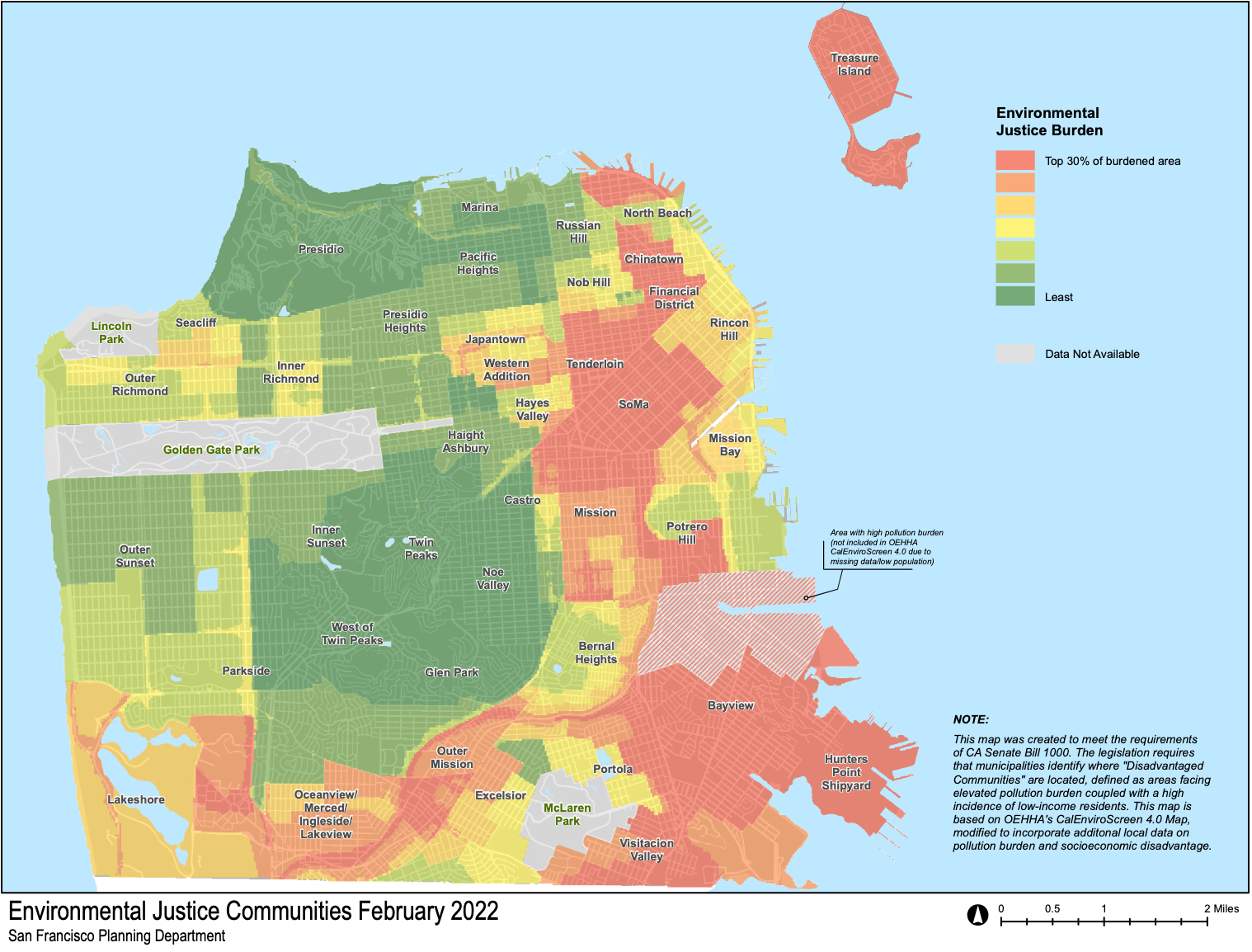As an outcome, achieving racial equity would mean living in a world where race is no longer a factor in the distribution of opportunity. The 10-Year Capital Plan strives to fund projects that address racial and social disparities and promote equity in the services delivered by the City’s facilities and infrastructure. Many capital departments and agencies have developed equity assessments and strategic plans that inform capital investment priorities, such as the Recreation and Park Department’s Equity Zone metrics, Muni Service Equity Strategy, and Department of Public Health’s Community Health Needs Assessment.
The Planning Department developed the Environmental Justice (EJ) Framework through a collaborative process with community-based organizations to inform the creation of the city’s first Environmental Justice Element of the General Plan. This framework proposes policies that ensure the residents of communities that face the highest burden from historic chronic patterns of disinvestment are centered in receiving new services and amenities during the future development of the city. These include policies around clean and healthy environments, healthy food access, healthy public facilities; safe, healthy affordable homes, physical activity, racial equity and empowered neighborhoods, climate resilience and justice, as well as equitable green jobs in the new economy. An EJ Communities Map uses a variety of environmental and socioeconomic information to determine where residents face the highest burden.
In addition, the Office of Resilience and Capital Planning has included racial equity lens questions in the capital budget process for departments to demonstrate how capital budget project requests address the equity needs of specific populations or geographies. Many capital projects demonstrated extensive community engagement to ensure the project design meets the needs of the community. Examples of recent capital projects that demonstrated a strong nexus to racial equity goals included Chinatown Branch Library Renovation, India Basin, Fiber to Affordable Housing, and Infill Sidewalks in the Bayview. Approximately 18% of the FY22-23 Capital Budget was allocated to projects advancing racial equity.
In order to continue funding projects that contribute to a more equitable San Francisco, this Plan calls for investments in areas where racial disparities continue to be significant, including public health and affordable housing.
Public Health
San Francisco is working to meet persistent and emerging mental health and substance abuse challenges. The Department of Public Health (DPH) is the City’s largest provider of behavioral health services, helping approximately 30,000 individuals annually. DPH also operates more than a dozen community-based primary care health centers that provide convenient access to health care services in neighborhoods across the City. The November 2020 Health and Recovery Bond provides a portion of the crucial funding necessary to improve, acquire, and construct public facilities that deliver services for people requiring mental health and substance use services and for upgrades to community health centers that serve low-income and vulnerable communities so that patients can be treated safely and properly. Additional investment in several community clinics such as the Chinatown Public Health Center Seismic Retrofit and Silver Avenue Family Health Center Renovation, is planned in the 2024 Public Health Bond.
Affordable Housing
To become a truly resilient and equitable city, San Francisco must tackle the challenges of unaffordability for residents today and proactively build for the future. Affordable housing is critical to the City’s economic and social health. Without housing that is affordable to a range of incomes, San Francisco risks losing communities of color, essential workers, and families. Moving forward, San Francisco will continue to prioritize the production and preservation of affordable homes. This commitment includes investments in affordable housing at low and moderate incomes.
Since 2015, San Francisco has passed $1.1 billion in affordable housing bonds, supporting the construction of new affordable homes, accelerating the rebuilding of distressed public housing sites, and preserving affordability in existing housing at risk of market-rate conversion or loss due to physical disrepair. Additional investment is planned for the 2024 Affordable Housing Bond.


